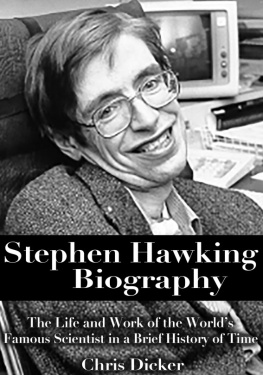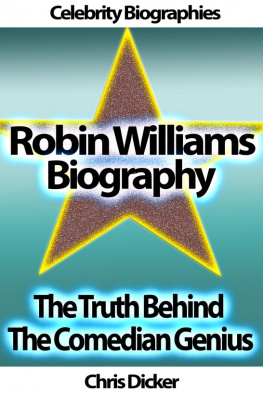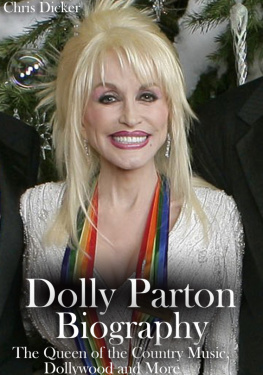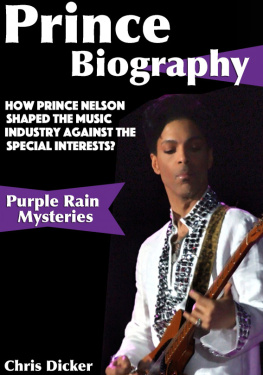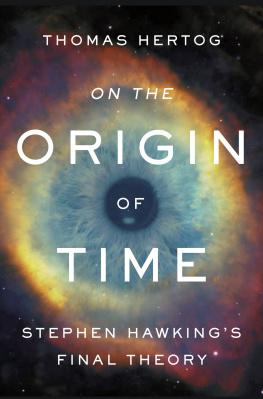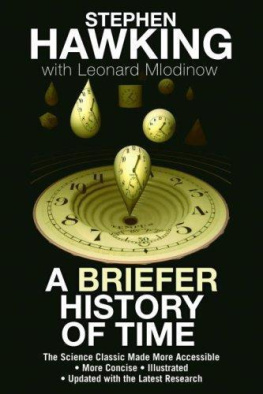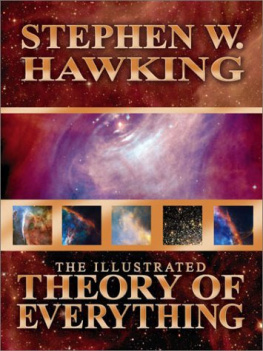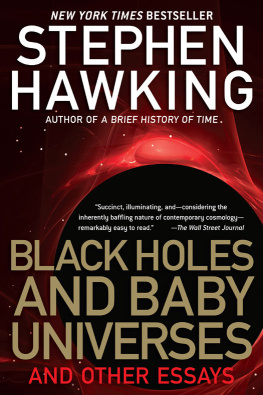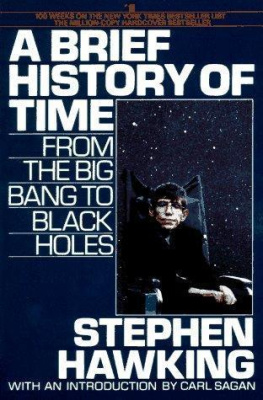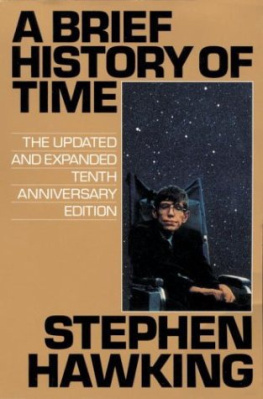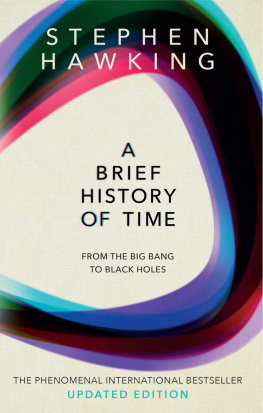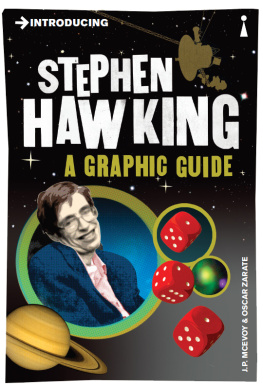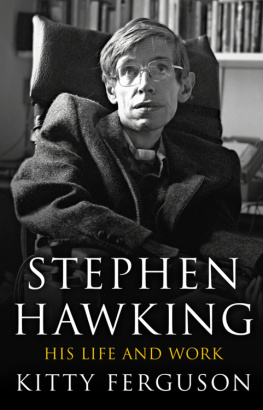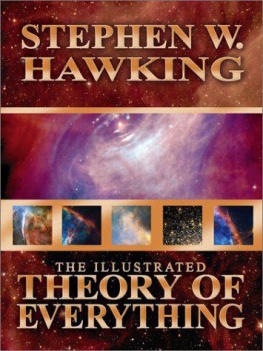Stephen Hawking Biography: The Life and Work of the WorldsFamous Scientist in a Brief History of Time
Chris Dicker
Published By Chris Dicker At Smashwords
Copyright 2017 Chris Dicker
This publication is geared towards providing exact andreliable information in regards to the topic and issue covered. Thepublisher is not required to render accounting, officiallypermitted, or otherwise, qualified services.
Its prohibited to reproduce, duplicate, or transmit any partof this publication in either electronic means or printed format.Recoding of this publication is strictly prohibited and any storageof this document is not allowed unless with written permission fromthe publisher. All rights are reserved!
The information provided herein is stated to be truthful andconsistent, in that any liability, in terms of inattention orotherwise, by any usage or abuse of any policies, processes, ordirections contained within is the solidary and utterresponsibility of the recipient reader. Under no circumstances willany legal responsibility or blame be held against the publisher forany reparation, damages, or monetary loss due to the informationherein, either directly or indirectly.
The information herein is offered for informational purposessolely, and is universal as so. The trademarks that are used arewithout any consent, and the publication of the trademark iswithout permission or backing by the trademark owner. Alltrademarks and brands within this digital book are for clarifyingpurposes only and are owned by the owners themselves, notaffiliated in this document.
Book cover image photographed by NASA in StarChild LearningCenter . [ PublicDomain ]
Table of Contents
Birth a nd first years (1942-1952 )
It is long known thatscientists are difficult, unpopular people, lost in their veryspecialised fields, creating theories that no one understands,esteemed but not loved, of which one must learn the dreadfulscience lessons in school.
All of this might be true for all scientists except forStephen Hawking.
He is famous not only for hisscientific theories, but for making the science accessible and fun,and for bringing highly theoretical concepts within everyonesgrasp.
He did all of this and a lotmore while struggli ng with an awful disease, that made him incapable to moveand almost unable to communicate.
His entire life represents the triumph ofthe spirit over the matter; he is a model for all of us, even ifhis life was not in all aspects exemplary.
Hawking s parents, Isobel and Frank metduring the war at the National Institute for Medical Research,where Isobel was working as a secretary and Frank was a medicspecialized in tropical diseases. Both of them had studied inOxford even if their respective families were not very well-off.Despite her studies in Philosophy, Economics and Politics, Isobelwas unable to find a job suited to her qualifications and ends upas secretary. As she meets the dashing young Frank, who was justreturning from one of his research trips to India, she falls inlove and they decide to create a family. Both of them were young,educated, a bit eccentrical and in many ways ahead of theirtimes.
Isobel travelled to Oxford one week beforebirth, to avoid the heavy London bombings, as there was anagreement between England and Germany to spare Oxford and Cambridgefrom bombing.
Hawking was born on8 th of January 1942, exactly 300 years after Galileo Galileisdeath, fact which was seen as a premonition of his future career,although the savant himself said that there were probably 200,000other children born that day, and none of them becameastronomers.
Later the coupleha d two morechildren, Mary and Philippa and they adopted a boy,Eduard.
Until 1950 , Hawkings family lived inLondon where Stephen began his education at Byron House School inHighgate. This private school used different teaching methods fromthe traditional school system. Later Hawking complained that hedidnt learn anything in this school, because at the age of 8 hecouldnt read yet.
After the war, Frank wasoffered the position as the head of the Division of Parasitology atthe National Institute of Medical Resea rch and they moved to St. Albans, atown en vogue at the time, as many middle-class families decided tolive there. Stephens father was well aware of the role of a goodeducation for ones future, so he wanted his son to go toWestminster, the best school in the country. Unfortunately, in theday of the examination, Stephen got ill; therefore he was unable totake the exams. The alternative choice was the St Albans privateschool where Stephan Hawking started his classes in1952.
Secondary school St. Albany (1953-1958)
The school life was at firstunappealing for the young Stephan, he was considered eccentrical,nerdy, and his speech was not easy to understand due to hislisping ,which he inherited from his father.
By the third year, he found asmall group of friends with shared interests and his life becamemore intense.
Although the young boys werevery busy with their homework, mandatory sportive activities andmany other tasks that the school imposed on them, they still foundtime for their elitist hobbies: listening to classical music,reading modern writers like Kingsley Amis, Aldous Huxley or WilliamGolding and playing sophisticated games.
The school had a very high intellectual standard so Stephenhas the opportunity to start his scientific formation on very goodpremises.
One of his teachers was Mr.Finley, who had very progressive ideas and provoked his students tointense debates on hot topics like nuclear disarmament.
Outside school, Stephen and hisfriends used to go riding bikes on the countryside or spend theirfree time inventing and playing board games. Stephen was usuallythe mastermind who invented the rules, which were sometimes socomplicated that often the games couldnt be finished.
The games took place sometimesat Stephens house, a home cluttered with books, painting and manyother objects brought from his father from his trips. Stephensparents showed little interest to the external aspects of theirlife, being busy on feeding their minds. There are accounts thatthey read books during dinner, and often they took long trips, asthe one they to ok to India for a year, trip in which Stephen Hawkingdidnt take part, as he couldnt leave school.
After the board game phase, the group ofboys built model aircrafts and other electronic devices. StephenHawking was not very good at handicraft as his mind was moreinclined towards abstract thinking, but this phase showed alreadyhis developing interest for science.
Later on, in 1954, the boysmove d fromscience to religion and as they grew older, they started to askthemselves the big questions. Their forming intellect isquestioning everything and their intense debates helped themrealize who they were. Stephen is rather a rationalist and even atthis young age he prefers to trust his own mind instead ofbelieving in an evasive God.
Anothertheme , whichcaught their attention was the extrasensory perception, apseudoscience but Stephen was soon bored as he realized that therewas nothing scientific about it.
In the last year in secondaryschool, Stephe n Hawking and his group of friends built a primitivecomputer, an extraordinary achievement because at the late 50s thecomputing machines were just at their incipient phase. Stephenscomputer was called LUCE and it did perform some basic mathematic sums.
At fourteen , Stephens propensity towardsmathematics and physics was already obvious and his teachersnoticed that he was capable of excellent results with very littlework. He had simply a feeling for it; he knew the right answerwithout thinking too much.
His math teacher, Dikran Tahta was the one who influenced himand showed him the way into the world of science.
His father supported Stephensinterest in natural science in the hope that he will follow hissteps in medical field. In his first years , Stephen made no difference betweenthe different science fields but as teenager he realized that hewanted to study Physics because it was for him the fundamentalscience, the one that could offer him answers at the essentialquestions: from where are we coming, why are we here and where arewe going.
Next page
